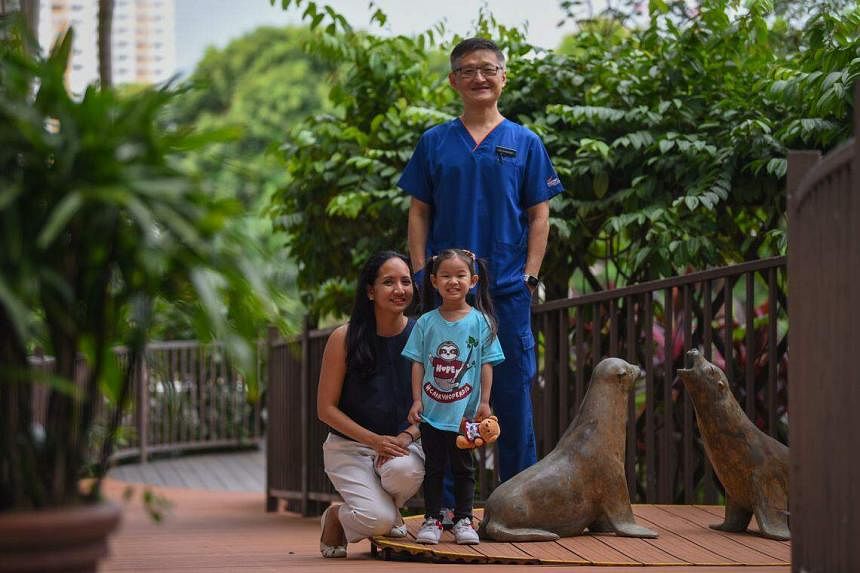SINGAPORE – Madam Francesca Khor did not see her second daughter, Ellie Hui, till more than four hours after her birth in September 2019 because the newborn had breathing problems that had to be treated immediately.
When Ellie was four months old, a doctor at the polyclinic where she went for her childhood vaccination shots noticed a white patch on her skin and suspected it was caused by tuberous sclerosis complex (TSC), a genetic disorder that causes tumours to grow in various parts of the body. The doctor referred the infant to the National Skin Centre for an appointment a few weeks later.
An anxious Madam Khor could not wait and took her to her paediatrician at KK Women’s and Children’s Hospital (KKH). Also suspecting the child had TSC, the paediatrician ordered scans of Ellie’s brain, heart, abdomen, kidneys and eyes.
In the meantime, Madam Khor hit the internet to find out more about the disease.
“It scared us completely,” recalled Madam Khor, 39, who is the general manager of a direct sales company. “There was so much fear, I practically lost my mind for a couple of months. There was no way to know if she would be able to talk or walk.”
Tumours in the brain can cause epileptic fits and significant cognitive impairment. Half of the patients with TSC are autistic or have learning disorders. One in four has an IQ of below 50 (most people score between 85 and 115).
Aside from the scans, Ellie’s blood was sent to the US for genetic testing. The test confirmed that she has TSC, although by then, Madam Khor said they already knew.
The tumours Ellie had were scattered around her brain, and the tumours on her skin were in the form of white patches, as well as a small one on her face that looked like orange peel.
About three in four people with TSC have skin tumours. “These are sunlight-dependent – the greater the exposure to the sun, the worse it becomes,” said Dr Loh Ne-Ron, a neurologist who runs the TSC clinic at KKH.
Ellie also had a large lesion on a neck vertebra that they feared might be bone cancer given its size, but a biopsy proved that it was benign.
About 30 per cent of TSC patients would have inherited the disease from a parent. For the rest, the condition is caused by a spontaneous mutation of their DNA.
Because of Ellie’s condition, Madam Khor, her husband and their older daughter moved in with her parents, “so there would be more eyes on her” should anything untoward happen.
“We consistently watched all the childhood milestones, such as eye contact, number of words she learnt, when she started walking, and every check-up with her paediatrician was very thorough,” Madam Khor said.
At just over the age of one, Ellie started getting absent seizures two to three times a day. She could be running around when she would suddenly stop, her eyes blank like she was in a trance, and her body would bob up and down slightly.
At the start, each episode lasted only a few seconds. When it was over, she might be a bit cranky and needed some comforting. Then the seizures lasted longer, up to five minutes or more. The doctor put her on seizure medication.
Said Madam Khor: “We never missed a dose of her medicine. If she was asleep, we would wake her up to give it to her.”
A few months later, Ellie’s seizures stopped occurring.
Madam Khor and her husband have decided to give Ellie as normal a life as possible, and enrolled her in childcare, as they had done with her older sister.

“But we shared her condition with the teachers there, the signs to look out for, and should there be an emergency, I told them to call the ambulance before calling me,” she said. Fortunately, this course of action has not been needed.
There are some fruits that she cannot take, such as grapefruit, some types of oranges and starfruit, as they may increase the effects of the seizure drug, possibly causing harmful side effects. Ellie, who is four years old now, has learnt to avoid these fruits, as well as lollipops in these flavours.
Her sister, Penny, who is three years older, acts as her “food police” and tells restaurants not to serve oranges on their fruit platter.
Every two to three years, Ellie needs to undergo a series of scans to check that she does not have tumours that would endanger her.
Dr Loh has not put her on TSC medication that can shrink the tumours because, aside from the seizures, they are not causing her any problems. She still takes medication for seizures twice a day.
The drugs for TSC come with side effects such as mouth ulcers and diarrhoea, and have to be taken for life. There are ongoing studies in the US to see if patients can be weaned off the drugs once the tumours have shrunk.
Over the past four years, Madam Khor has had a support group with eight other TSC patients or their caregivers. She said sharing their experiences and fears helps one another in the group.
Madam Khor said that in the first year after Ellie was diagnosed with TSC, “I was crying over everything”.
But now, as Ellie is growing up like a normal chirpy four-year-old, and there is a specialised TSC clinic with good knowledge of the disease, “there is a light at the end of the tunnel”.


